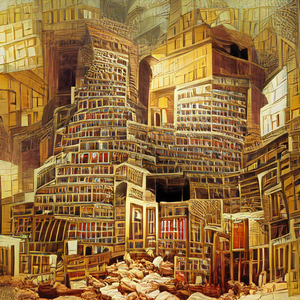Library of Babel: Difference between revisions
mNo edit summary |
mNo edit summary |
||
| (3 intermediate revisions by the same user not shown) | |||
| Line 1: | Line 1: | ||
<seo title="The Library of Babel" metakeywords="1,000 monkeys on type writers, infinite knowledge" metadescription="The library of Babel, what if all knowledge that could be created was on the internet?"/> | <seo title="The Library of Babel" metakeywords="1,000 monkeys on type writers, infinite knowledge" metadescription="The library of Babel, what if all knowledge that could be created was on the internet?"/> | ||
[[File:Library planet.png|alt=Library planet|thumb|'''Figure 1'''. Imagine every book ever written.]] | [[File:Library planet.png|alt=Library planet|thumb|'''Figure 1'''. Imagine every book ever written.]] | ||
'''The Library of Babel is a metaphor | '''The Library of Babel is a metaphor describing how information has become so abundant on the internet, there is sufficient evidence on both sides of any argument to prove or disprove it.''' This concept comes from a science fiction short story, thought experiment by Jorge Luis Borges called "''The Library of Babel''": | ||
''"Imagine a planet which contains all possible 410-page books of a certain format and character set. The majority of the book would be gibberish, however, like 1,000 monkeys bashing the keys on typewriter for infinity, some books in the library would detail the entire works of Shakespeare and beyond."'' | |||
The Library is now analogous to the internet as vast reams of content is now being generated on the basis of what gets clicks as opposed to what is factually correct. To navigate this, [[critical analysis]] skills are now a necessity to see fact through the quagmire of data. | |||
Latest revision as of 23:39, 2 July 2023
The Library of Babel is a metaphor describing how information has become so abundant on the internet, there is sufficient evidence on both sides of any argument to prove or disprove it. This concept comes from a science fiction short story, thought experiment by Jorge Luis Borges called "The Library of Babel":
"Imagine a planet which contains all possible 410-page books of a certain format and character set. The majority of the book would be gibberish, however, like 1,000 monkeys bashing the keys on typewriter for infinity, some books in the library would detail the entire works of Shakespeare and beyond."
The Library is now analogous to the internet as vast reams of content is now being generated on the basis of what gets clicks as opposed to what is factually correct. To navigate this, critical analysis skills are now a necessity to see fact through the quagmire of data.
